Related Research Articles

Yoko Ono/Plastic Ono Band is the debut solo studio album by Japanese artist and musician Yoko Ono, released on Apple Records in December 1970 alongside her husband's album John Lennon/Plastic Ono Band. The album features Ono's vocal improvisations accompanied by the Plastic Ono Band, with the exception of "AOS", on which she is backed by the Ornette Coleman Quartet.

"Isolation" is a 1970 song appearing on John Lennon's first official solo album release, John Lennon/Plastic Ono Band. It ends side one of the album, and is the fifth track. In the Philippines, Apple Records released "Isolation" as the B-side to "Mother", the single off John Lennon/Plastic Ono Band, in contrast to most countries where the B-side was Yoko Ono's "Why". It was also released on an EP in Mexico along with "Mother", "Look at Me" and "My Mummy's Dead".
"Grow Old with Me" is one of the final songs written by John Lennon. It was first recorded by Lennon as a demo while in Bermuda. A handwritten lyric sheet for the song is dated July 5, 1980 Fairyland Bermuda. The song was first released on the posthumous album Milk and Honey in 1984. It was also rumoured to be among the songs planned as a possible reunion single by his former bandmates during the making of The Beatles Anthology.
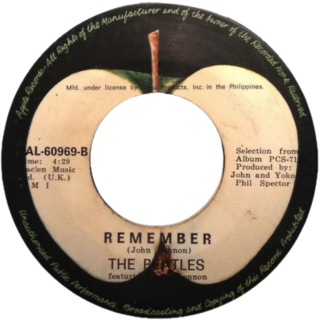
"Remember" is a song by the English rock musician John Lennon from his 1970 album John Lennon/Plastic Ono Band.
"Well Well Well" is a song by the English musician John Lennon from his 1970 album John Lennon/Plastic Ono Band. The eighth and longest track on the album, "Well Well Well" features an aggressive guitar sound, screaming vocals and a pounding backing track.
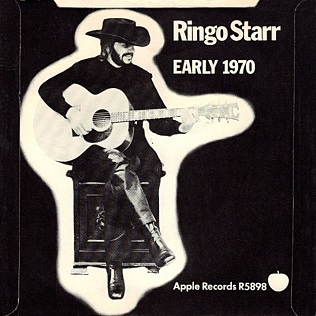
"Early 1970" is a song by the English rock musician Ringo Starr that was released as the B-side of his April 1971 single "It Don't Come Easy". A rare example of Starr's songwriting at the time, it was inspired by the break-up of the Beatles and documents his relationship with his three former bandmates. The lyrics to the verses comment in turn on Paul McCartney, John Lennon and George Harrison as individuals, and the likelihood of each of them making music with Starr again. In the final verse, Starr offers a self-deprecating picture of his musical abilities and expresses the hope that all four will play together in the future. Commentators have variously described "Early 1970" as "a rough draft of a peace treaty" and "a disarming open letter" from Starr to Lennon, McCartney and Harrison.

"My Mummy's Dead" is the closing song on the album John Lennon/Plastic Ono Band by John Lennon. The song was also released on a Mexican EP that also contained "Mother", "Isolation" and "Look at Me".
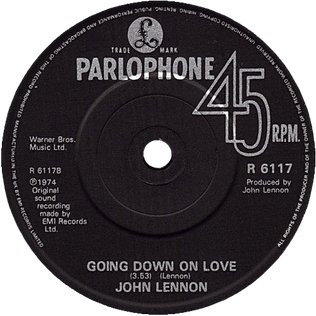
"Going Down on Love" is a song by John Lennon, released as the first track on his 1974 album Walls and Bridges. It was also released as the B-side of Lennon's "Jealous Guy" single in 1985.
"Old Dirt Road" is a song written by John Lennon and Harry Nilsson, first released on Lennon's 1974 album Walls and Bridges. Nilsson later recorded the song on his 1980 album Flash Harry.

"I'm Losing You" is a song written by John Lennon and released on his 1980 album Double Fantasy. It was written in Bermuda in June 1980, after several attempts by Lennon to call his wife, Yoko Ono, who remained in New York. The song is also available on the 1982 compilation The John Lennon Collection, the 1998 boxset John Lennon Anthology, the one disc compilation Wonsaponatime, the 2005 two disc compilation Working Class Hero: The Definitive Lennon and in 2010 for the Gimme Some Truth album. The song was also featured in the 2005 musical Lennon.

"Sisters, O Sisters", also known as "Sisters O Sisters", is a song written by Yoko Ono that first appeared on John Lennon's and Yoko Ono's 1972 Plastic Ono Band album Some Time in New York City, backed by Elephant's Memory. It was also released as the b-side to the couple's "Woman Is the Nigger of the World" single. It has been covered by a number of artists, including Le Tigre and Tater Totz.
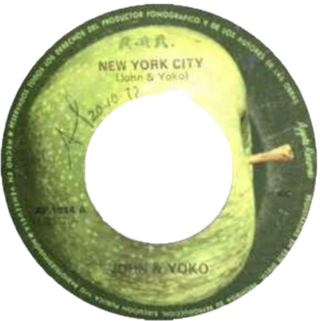
"New York City" is a song written by John Lennon that was first released on Lennon's and Yoko Ono's 1972 Plastic Ono Band album Some Time in New York City.
"We're All Water" is a song written by Yoko Ono that was first released on the 1972 John Lennon and Yoko Ono Plastic Ono Band album Some Time in New York City. It was the last song on the first record of the album, and the last song on the album that was recorded in the studio.

"What You Got" is a song written by John Lennon that was first released on his 1974 album Walls and Bridges. It was later released as the B-side to his top 10 "#9 Dream" single.
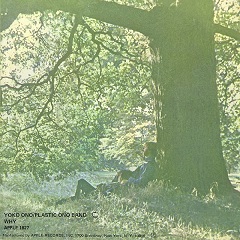
"Why" is a song written by Yoko Ono that was first released on her 1970 Yoko Ono/Plastic Ono Band album. In the U.S. it was also released as the B-side of John Lennon's "Mother" single, taken from his John Lennon/Plastic Ono Band album.

"Touch Me" is a song written by Yoko Ono that was first released on her 1970 album Yoko Ono/Plastic Ono Band. An edited version was later released in the U.S. as the b-side to John Lennon's single "Power to the People."
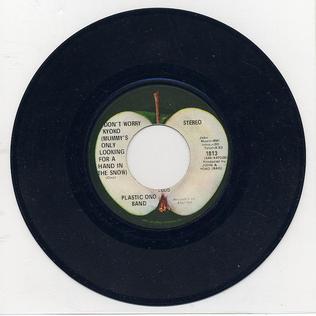
"Don't Worry Kyoko (Mummy's Only Looking for Her Hand in the Snow)" is a song by Yoko Ono that was originally released by Plastic Ono Band in October 1969 as the B-side of the "Cold Turkey" single, and was later released on Ono's 1971 album Fly. Several live versions have been released, including on Plastic Ono Band's Live Peace in Toronto 1969 and the John & Yoko/Plastic Ono Band With Elephant's Memory album Some Time in New York City in 1972. An early version was titled "Mum's Only Looking for Her Hand in the Snow". It has been covered by several other artists.

"Who Has Seen the Wind?" is a song written by Yoko Ono that first appeared as the B-side of John Lennon's single "Instant Karma!" It was later issued as a bonus track on a compact disc version of the Wedding Album.

"Listen, the Snow Is Falling" is a song written by Yoko Ono and recorded by Ono and the Plastic Ono Band that was first released as the B-side of John Lennon's 1971 single "Happy Xmas ." A version of the song was later released on a reissue of Lennon and Ono's Wedding Album and was covered by Galaxie 500.
"Sunday Bloody Sunday" is a song written by John Lennon and Yoko Ono that was first released on their 1972 Plastic Ono Band album with Elephant's Memory, Some Time in New York City. The song addresses the Bloody Sunday massacre of 1972 and is one of two on the album that addresses the contemporary Northern Ireland conflict, "The Luck of the Irish" being the other.
References
- ↑ "Hold On". The Beatles Bible. 2 August 2010. Retrieved 20 July 2017.
- 1 2 3 4 5 Jackson, A.G. (2012). Still the Greatest: The Essential Solo Beatles Songs. Scarecrow Press. p. 85. ISBN 9780810882225.
- 1 2 3 Urish, B.; Bielen, K. (2007). The Words and Music of John Lennon. Praeger. p. 18. ISBN 978-0-275-99180-7.
- 1 2 3 Mellers, W. (1973). The Music of the Beatles. Schirmer Books. p. 163. ISBN 0-670-73598-1.
- ↑ Madinger, Chip; Raile, Scott (2015). LENNONOLOGY Strange Days Indeed - A Scrapbook of Madness. Chesterfield, MO: Open Your Books, LLC. p. 210. ISBN 978-1-63110-175-5.
- 1 2 Rogan, J. (1997). The Complete Guide to the Music of John Lennon. Omnibus Press. pp. 38–39. ISBN 0711955999.
- ↑ Blaney, John (2005). John Lennon: Listen To This Book. Guildford, Great Britain: Biddles Ltd. p. 57. ISBN 0-9544528-1-X.